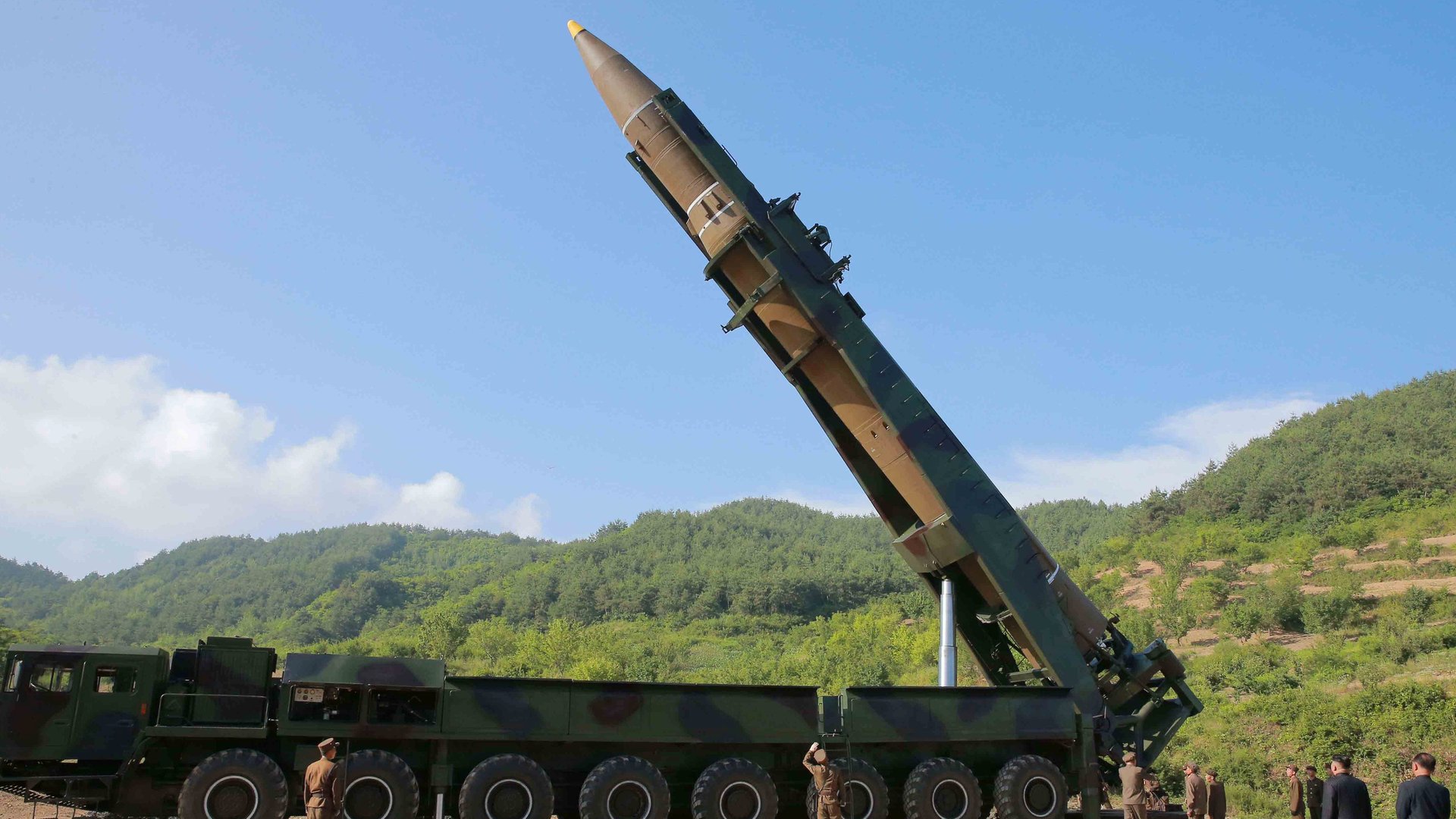Could the US stop an unprovoked attack by North Korea?
A bout of verbal posturing between US president Donald Trump and the North Korean regime has set the world’s nerves on edge. Could two ill-tempered leaders—with an eerily similar line in inflammatory rhetoric—goad each other into nuclear war? Quartz asked three Pyongyang experts to help explain what we know and don’t know about North Korea’s capacity to attack the US, and the US’s capacity to respond.


A bout of verbal posturing between US president Donald Trump and the North Korean regime has set the world’s nerves on edge. Could two ill-tempered leaders—with an eerily similar line in inflammatory rhetoric—goad each other into nuclear war? Quartz asked three Pyongyang experts to help explain what we know and don’t know about North Korea’s capacity to attack the US, and the US’s capacity to respond.
What sorts of missiles does North Korea have?
It has intercontinental ballistic missiles, or ICBMs. Estimates from Pyongyang’s most recent test on July 28 put their range at about 6,000 miles (9,700 km), according to Tom Collina, director of policy at Ploughshares Fund, an organization focused on reducing nuclear proliferation.
Could North Korea hit the US with an ICBM?
“North Korea hasn’t proven it can do anything in terms of launching an attack against the US or even Guam,” said Joel Wit, a senior fellow at the US-Korea Institute at SAIS and founder of 38North, which provides analysis of news from Pyongyang. “We think based on the evidence that that they can probably build a weapon small enough to put on one of their missiles that can reach targets in their region. Whether they can do it with a missile that can reach the US is, I think, unclear.”
According to the Washington Post (paywall), a confidential report from the US Defense Intelligence Agency (DIA) said North Korea already has the ability to attach a miniature nuclear warhead to those missiles. Wit cautions that “the Defense Intelligence Agency estimates are usually fairly extreme in their views in terms of what other countries can do.” However, he added, “whether [North Korea] can put a warhead on top of an ICBM today or tomorrow or the week after or the month after, the point is that this train is coming down the tracks. We need to think about that and be ready for it.”
What happens if North Korea launches a first strike at the US?
The US monitors North Korea using various means, including satellite imaging, intercepted communications, and spies within the country, Wit says. Private firms with government funding are also working on satellite-based radar that could watch for launches even through cloud cover, which can block conventional satellite imaging.
If North Korea were to launch a missile, the US could spot it and work out where it’s heading, says Wit, but intercepting it would be much harder. America has three lines of defensive rockets that could take out an ICBM, in increasing order of distance from North Korea, according to ABC News: in south Korea, on US Navy ships in East Asia, and in Alaska and California. They’re not a guaranteed defense, however.
Jon Wolfsthal, scholar of nuclear policy at Carnegie, likens missile defense to “trying to hit a bullet with a bullet.” Four interceptor missiles have to attack each ICBM to be reasonably sure of shooting it down. “They have a lower reliability than the 1998 Acura in your driveway,” he said.
Collina echoed Wolfsthal’s assessment, saying defense systems are largely symbolic. “No American president could depend on that as plan A,” he said. “They make us feel good. But in the end of the day, they won’t work.”
How likely is North Korea to attack the US?
Unlikely, experts believe, because the regime isn’t suicidal. “If North Korea attacks the United States, there will be no North Korea anymore… The United States would respond with overwhelming force,” Collina said.
Yet Wit cautioned that Trump’s incendiary rhetoric is dangerous. ”Words have consequences. Particularly words spoken by the president of the United States,” he said. “There are no diplomatic relations. We don’t have regular meetings with them. So [North Korea] has to rely on what’s said publicly and figure out whether that’s serious or not.”
Collina echoes that view. “We have these two inexperienced, bombastic leaders that are saying things that they shouldn’t say and could stumble into a nuclear catastrophe,” he said. “Now that’s the biggest danger, not that North Korea will do something by intent.”